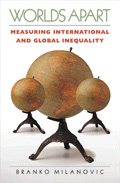Branko Milanovic

Worlds Apart: Measuring International and Global Inequality
Top World Bank economist Branko Milanovic analyzes income distribution worldwide using, for the first time, household survey data from more than 100 countries. This offers a more accurate way of measuring inequality and discusses the relevant policies of first-world countries and NGOs.
Source: Princeton

Inequality has increased between nations over the last half century (richer countries have generally grown faster than poorer countries). And yet the two most populous nations, China and India, have also grown fast. But over the past two decades inequality within countries has increased. As complex as reconciling these three data trends may be, it is clear: the inequality between the world's individuals is staggering. At the turn of the twenty-first century, the richest 5 percent of people receive one-third of total global income, as much as the poorest 80 percent. While a few poor countries are catching up with the rich world, the differences between the richest and poorest individuals around the globe are huge and likely growing.
ABOUT THE AUTHOR
Branko Milanovic is Lead Economist in the World Bank research department, working on income inequality and poverty. The author of Income, Inequality, and Poverty during the Transition and the coauthor of Income and Influence: Social Policy in Emerging Market Economies, he is currently a senior associate with the Carnegie Endowment for International Peace and a visiting professor at the School for Advanced International Studies, Johns Hopkins University.
REVIEWS
"Don't be fooled by globalization's noisy naysayers or proponents, who invoke the rise or decline of 'global inequality' to make their case. Here, in the first comprehensive look at inequality across the world's individuals as well as the world's nations, are laid out the many definitions of global inequality, and comprehensive, evidence-based analysis about the course of global inequality, variously defined, before and during our globalization era."
—Nancy Birdsall, founding President of the Center for Global Development
"Branko Milanovic's painstaking work takes us closest to a global understanding of income disparities at the present time. Among many other things, his work underscores that while national level income disparities are often obscene, international differences account for much more of the even more obscene level of global income inequality."
—Jomo K. S., Assistant Secretary General for Economic Development, United Nations
"Worlds Apart is a real tour de force. It presents a new interpretation of trends in the distribution of income among the world's countries and individuals, and makes a strong argument that global income inequality can be and should be reduced. In this emerging issue area of international politics it will become a standard reference."
—Robert Hunter Wade, London School of Economics
"A fascinating read. This book is a helpful primer to help you find your way around the complex debates surrounding global inequality. It is also a forceful demonstration that the world economy remains much too unequal."
—Dani Rodrik, Harvard University
"An important book by a master of the relevant data. Milanovic provides hard answers to tough questions."
—Samuel Bowles, Santa Fe Institute, author of Microeconomics: Behavior, Institutions, and Evolution
About the Author

Former Adjunct Scholar
Milanovic is a lead economist in the World Bank's research department,where he has been working on the topics of income inequality and globalization. Previously, he was a World Bank country economist for Poland and a research fellow at the Institute of Economic Sciences in Belgrade.
- Global Crisis: How Far to Go? Part IIn The Media
- Why Did the Poorest Countries Fail to Catch Up?Paper
Branko Milanovic
Recent Work
Carnegie does not take institutional positions on public policy issues; the views represented herein are those of the author(s) and do not necessarily reflect the views of Carnegie, its staff, or its trustees.
More Work from Carnegie Endowment for International Peace
- What We Know About Drone Use in the Iran WarCommentary
Two experts discuss how drone technology is shaping yet another conflict and what the United States can learn from Ukraine.
Steve Feldstein, Dara Massicot
- Beijing Doesn’t Think Like Washington—and the Iran Conflict Shows WhyCommentary
Arguing that Chinese policy is hung on alliances—with imputations of obligation—misses the point.
Evan A. Feigenbaum
- A China Financial Markets PostCommentary
Description of the post.
Michael Pettis
- Axis of Resistance or Suicide?Commentary
As Iran defends its interests in the region and its regime’s survival, it may push Hezbollah into the abyss.
Michael Young
- How Far Can Russian Arms Help Iran?Commentary
Arms supplies from Russia to Iran will not only continue, but could grow significantly if Russia gets the opportunity.
Nikita Smagin










